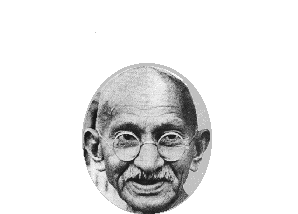
Gandhi's formal education began immediately on the move to Rajkot, where he enrolled in a school created by the British. Except in his early years, all his schooling was done in English. However, at home the influence of Western secular thought was minimal, and he was exposed to traditional Jain influences. In his later autobiography he records a major deviation from tradition in his secret experiments with eating meat when he was in his early teens. He seems to have reverted to vegetarianism quite soon.
When he was sixteen, his father died, leaving him to become the prime minister of Rajkot. Six months later, the British took over direct control of the kingdom and removed many members of his family from the administration. A friend of the family then advised him to go to London to study law. Having taken a vow not to touch meat, wine or women, he left the country in 1886.
Mohandas K. Gandhi was born in 1869 to Hindu parents in the state of Gujarat in Western India. He entered an arranged marriage with Kasturbai Makanji when both were 13 years old. His family later sent him to London to study law, and in 1891 he was admitted to the Inner Temple, and called to the bar. In Southern Africa he worked ceaselessly to improve the rights of the immigrant Indians. It was there that he developed his creed of passive resistance against injustice, satyagraha, meaning truth force, and was frequently jailed as a result of the protests that he led. Before he returned to India with his wife and children in 1915, he had radically changed the lives of Indians living in Southern Africa.
Back in India, it was not long before he was taking the lead in the long struggle for independence from Britain. He never wavered in his unshakable belief in nonviolent protest and religious tolerance. When Muslim and Hindu compatriots committed acts of violence, whether against the British who ruled India, or against each other, he fasted until the fighting ceased. Independence, when it came in 1947, was not a military victory, but a triumph of human will. To Gandhi's despair, however, the country was partitioned into Hindu India and Muslim Pakistan. The last two months of his life were spent trying to end the appalling violence which ensued, leading him to fast to the brink of death, an act which finally quelled the riots. In January 1948, at the age of 79, he was killed by an assassin as he walked through a crowed garden in New Delhi to take evening prayers.
His stay in London was crucial to his later career. He was admitted to the bar after the completion of his studies. More important, he came into contact with people of other religions who had voluntarily adopted lifestyles similiar to his own-- including vegetarianism and a belief in non-violence.
He returned to India in 1890, a few months after the death of his mother. The twenty-one year old Gandhi tried to set up a practice in Bombay, but
failed, and had to move to his home town, where he joined his brother in doing petty legal work. Restless in his old surroundings, he soon left for
South Africa, where his brother had found him a job with a trading firm.